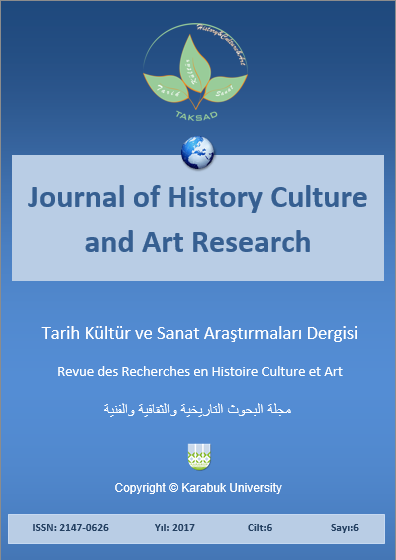What Drives Students of Vocational Training Program? An Investigation on the Significance of Foreign Language Acquisition
DOI:
https://doi.org/10.7596/taksad.v6i6.1325Anahtar Kelimeler:
Motivation- Foreign language acquisition- Motive- Internal motivation- External motivation.Özet
The paper dwells on the distinguishing the motives that drive students of vocational training program in terms of foreign language acquisition being the main component of future employment success. In fast-changing world which is teemed with new challenges and career patterns foreign language acquisition is viewed as a foremost aspects of promotion. The aim of the current study was to identify the main motives that drive students of vocational training program for foreign language acquisition and later equip higher education authorities and teaching staff with the data to improve language education complying with the students’ requirements. To find out internal and external motives of the students enrolled to the program at The Educational Center for Professional Communicative Training of Kazan Federal University a questionnaire survey was organized. The results of the research identify that there are differences in students’ priorities of external and internal motives and there is a prevalence of the internal ones. It is accounted for by the fact that students of the program realize the significance of foreign language acquisition for their personal needs and future professional activity. But practically all of them emphasized the same personal and interpersonal factors of internal motivation. The obtained findings will be exploited as recommendations in designing the syllabus and will be of great help in choosing the appropriate forms and techniques in carrying out the course.Referanslar
Galishnikova, E. M.; Baklashova, T. A. & Khafizova, L. V. (2016). Formation of Student's Tolerance in Multicultural Environment When Teaching a Foreign Language (KFU Experience, Kazan, Republic of Tatarstan, Russia). IFTE 2016 – 2nd International Forum on Teacher Education, 12, 38-44.
Grigoreva, E. V. & Solodkova I. M. (2015). Teaching English for undergraduate students: Motivational aspect. Mediterranean Journal of Social Sciences, 6(1), 341-345.
Grigorieva, E. V.; Ismagilova, L. R. & Solodkova, I. M. (2016). Comparative analysis of oral and computer based types of assessment in teaching English for students of economics, business and finance. ERPA International Congresses on Education 2015.
Grigoryan, S. T. (1979). On the question of the correlation of needs and motivation of students in the study of a foreign language. Age features of the cognitive activity of schoolchildren and students. Мoscow.
Grigoryeva, E. V. & Solodkova, I. M. (2015). Foreign language skill as a component of self-development procedure: undergraduate and graduate level. ICIBSOS The 4th International Congress on Interdisciplinary Behavior and Social Science 2015, Kazan Federal University, Russia, 22-23 October, 2015. Pp. 95-99
Ismagilova, L. R. & Polyakova, O. V. (2015). Problem of managers’ communicative competence formation. Social Sciences and Interdisciplinary Behavior - Proceedings of the 4th International Congress on Interdisciplinary Behavior and Social Science, ICIBSOS 2015, 109-114.
Khusainova, A. A. & Rahmatullina, A. R. (2014). English Language Training Volunteer Program as a New Reality for Russia and its Social Benefits. Procedia-Social and behavioral sciences, 152, 1101–1107.
Kolechenko, A. K. (2005). Encyclopedia of Pedagogical Technologies: A Handbook for Teachers. St. Petersburg: KARO.
Lepper, M. R. & Malone, T. W. (1987). Intrinsic motivation and instructional effectiveness in computer-based education. In R. E. Snow & M. J. Farr (Eds.), Aptitude, learning, and instruction: Vol. 3. Cognitive and affective process analysis (pp. 255-286). Hillsdale, NJ: Erlbaum.
Papalia, A. (1986). A research Report on Motivating the Language Learner. NYSAFLT Language Association Bulletin, 38.
Pulverness, A.; Klimova, I. I.; Kalugina, O. A.; Vasbieva, D. G. & Ismagilova, L. R. (2017). The formation of students' intercultural communicative competence in an English language learning environment at a non-linguistic higher school. XLinguae Scientific Language Journal, 10(4), 381-397.
Ur Penny. (1996). A course in language teaching. OUP.
İndir
Yayınlanmış
Nasıl Atıf Yapılır
Sayı
Bölüm
Lisans
Tarih Kültür ve Sanat Araştırmaları Dergisi'nde yayımlanan tüm çalışmalar Creative Commons 4.0 CC-BY lisansı ile lisanslanmıştır.
Bunları yapmakta özgürsünüz:
- Bu eseri her boyut ve formatta paylaşabilir — kopyalayabilir ve çoğaltabilirsiniz.
- Materyalden Adapte et — karıştır, aktar ve eserin üzerine inşa et
- her türlü amaç için, ticari amaç da dahil
Alttaki şartlar altında:
Atıf — uygun bilgiyi, lisansa linki, and ve değişiklik yapıldıysa değişiklik bilgisinivermelisiniz. Sizi veya kullanımınızı lisansörün onayladığı bilgisini içermemek kaydıyla, size uygun şekilde bu işlemleri gerçekleştirebilirsiniz.
AynıLisanslaPaylaş — Eğer materyali karıştırdınızsa, aktardınızsa ya da materyalin üzerine çalıştınızsa, ancak aynı lisans ile dağıtabilirsiniz.
- Ek sınırlamalar yoktur — Lisansın izin verdiği hakları başkaları üzerinde kanunlarla ya da teknolojiyikullanarak sınırlayamazsınız.







